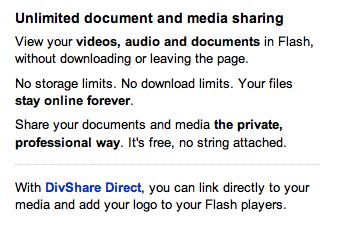
When MP3 blogs emerged a few years ago, I remember thinking “this can’t possibly go on, the record companies will squash these people.” Then again, the most popular musicbloggers more or less voluntarily adopted a fairly reasonable code of conduct. Note how Matthew from Fluxblog urges his readers to buy music on his sidebar, how he rotates files frequently, and provides links for purchasing the music he features (mostly positively). Given the homogeneous and stagnant cesspool that is contemporary rock radio, the emergence of this online genre was such an obviously good thing for the music industry that even the industry could see it. Not only did they not go to war with MP3 blogs, they quickly initiated clumsy and often highly successful efforts to co-opt them.
But we all know that the technology backdrop is not static. The sheer numbers of music bloggers doing their thing, and the emergence of aggregation and search services such as elbo.ws and especially skreemr.com makes it ridiculously easy to tap into vast stores of music posted here and there in small pieces scattered across the net. It’s far faster and easier to find music via this open-web grey market than it is from any illegal file sharing service that I’ve seen. In fact, if I’m at home, and get the impulse to turn my son Harry on to The Beatles’ “Hello, Goodbye”, it’s just seconds away, these services even have embeddable Flash players — faster than it is to pull out and lay down the vinyl, far easier than hunting through the criminally mismanaged CD collection.
And if listening to The Beatles gets me thinking I need to educate Harry on The Rutles, well, not only can we be instantly listening to Cheese and Onions, there’s a link to the Galaxie 500 cover as well — a wonderful version I had totally forgotten about.
And of course there’s always YouTube:
Combining Skreemr with DownThemAll is a powerful media cocktail. Say you just saw Dig! (and if you haven’t, and you love rock, you really must) and you’d like some Brian Jonestown Massacre in your mix. Simply search for the band name, ask the plugin to download all the MP3s on the results page (it’s not foolproof, but the DTA interface seems to avoid downloading redundant copies of tracks), and in a few short minutes you can gather 30 songs that have been selected by bloggy music fanatics. (As an aside, I single out BJM as an example in part because they already make all their vast back catalog freely downloadable on their own website.)
I find it hard to see how this can go on without the record companies engaging in one of their lash-out attacks — either targeting the bloggers, or the aggregation services…
I have to admit, I’ve been following the ongoing and accelerating meltdown of the music industry with more than usual interest and Schadenfreude lately (I recommend the opinionated and profane Lefsetz Letter)… There really does seem to be panic in the palatial business suites, witness the hiring of Rick Rubin to head Columbia, or this astonishing admission by Chairman and Chief Executive Officer of Warner Music Group Edgar Bronfman:
We expected our business would remain blissfully unaffected even as the world of interactivity, constant connection and file sharing was exploding. And of course we were wrong. How were we wrong? By standing still or moving at a glacial pace, we inadvertently went to war with consumers by denying them what they wanted and could otherwise find and as a result of course, consumers won.
For sheer comic value (see and click on the image at the top of this post) though, it’s hard to top Universal CEO Doug Morris:
“There’s no one in the record industry that’s a technologist,” Morris explains. “That’s a misconception writers make all the time, that the record industry missed this. They didn’t. They just didn’t know what to do. It’s like if you were suddenly asked to operate on your dog to remove his kidney. What would you do?”
Personally, I would hire a vet. But to Morris, even that wasn’t an option. “We didn’t know who to hire,” he says, becoming more agitated. “I wouldn’t be able to recognize a good technology person — anyone with a good bullshit story would have gotten past me.”
As the Vulture notes with some shock: “We’d always assumed the labels had met with a team of technology experts in the late nineties and ignored their advice, but it turns out they never even got that far — they didn’t even try! Understanding the Internet certainly isn’t easy — especially for an industry run by a bunch of technology-averse sexagenarians — but it’s definitely not impossible.”
It’s tempting to draw parallels between the music industry and my own racket, to wonder if ineffectually battling little-understood but evidently relentless technology trends might play out in a similar way in higher education. George Siemens is wondering that too. There are some obvious differences between the domains, but the contours of conflict sure do resemble one another. And I am certain that planning under the assumption things will always be as they are is the most foolish approach imaginable.













